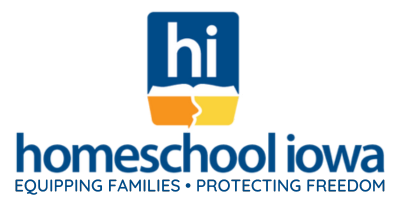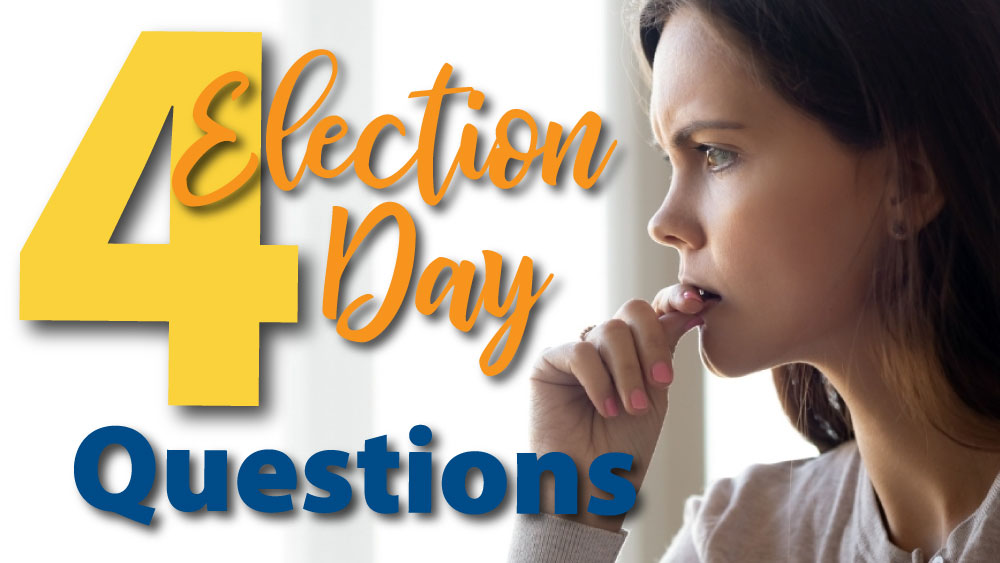A guest post by Shane Vander Hart,
homeschooling dad and editor of Caffeinated Thoughts.
Election Day is finally upon us. Some of us may have already voted in advance. Some of us may be planning to vote at the polls. Either way, we all will await results after voting concludes on November 3rd.
We've heard the message from various sources that 2020 is "the most important election in our lifetime."
Elections are important.
They do matter, and they do have consequences.
What will our approach to this election and its results teach our children?
We should ask ourselves four questions as we reflect upon this election and the examples we are presenting to our children in response to it.
Where do I place my trust?
We must teach our kids that we don't put our trust in election results. Salvation will not come through the White House or the Statehouse.
King David understood that government couldn't be what we place our trust in; he knew he could not trust his earthly kingdom to save the day.
We get a sense of this when we read Psalm 20.
"May the LORD answer you in the day of trouble! May the name of the God of Jacob protect you! May he send you help from the sanctuary and give you support from Zion!' (Psalm 20:1-2, ESV)
He continues, "Now I know that the LORD saves his anointed; he will answer him from his holy heaven with the saving might of his right hand. Some trust in chariots and some in horses, but we trust in the name of the LORD our God." (Psalm 20:6-7, ESV)
King David did not put his trust in his leadership, military, or kingdom's resources to provide the solution needed in the day of trouble. Instead, he put his faith in the One who had unlimited resources.
Regardless of the election outcome, God reigns. He is King, and one day His Kingdom will be realized by all. (Zechariah 14:9; Revelation 2:25-27; 5:9-10)
We know how this will end.

Am I voting my conscience or something else?
The Apostle Paul on trial before Felix said, "I always take pains to have a clear conscience toward both God and man." (Acts 24:16, ESV)
The word "conscience" in the original Greek used in the New Testament is "suneidesis." This word literally means "a knowing with." It is used 29 times in the New Testament.
Essentially it is used two different ways:
(1) "the consciousness of anything" and
(2) "the soul as distinguishing between what is morally good and bad, prompting to do the former and shun the latter; commending one, condemning the other."
In terms of voting, the second application is relevant. Your conscience should help you distinguish between what is morally right and wrong as you make choices up and down the ballot.
Wrestle with this with your children. Talk to them about the various choices. What does the Bible say about a leader's character and their policies (knowing that every candidate on the ballot is flawed in some way)? How do a candidate's policies and priorities resonate with a Christian worldview?
What is your conscience telling you?
You are to follow your conscience.
Not mine. Not your pastor's.
Yours.
To violate one's conscience, we are told in scripture, is a sin.
Romans 14:23 says, "For whatever does not proceed from faith is sin."
Now, the Apostle Paul writes this in the context of Jewish dietary laws and whether it was acceptable to eat certain types of food deemed "unclean." However, it applies in other areas of life as well.
Martin Luther once said, "to go against conscience is neither right nor safe."
Yet, be warned that, apart from Christ, our conscience is misguided. And if we live in sin, it can also be marred and dulled. There are times we can't trust our conscience because it needs to be calibrated to Christ and God's truth, not feelings or political talking points.
Staying rooted in the Word of God is vital.

Did I do my homework?
As homeschooling parents, we have been called to homeschool our children. We need to consider who will respect our rights as parents, particularly our right to educate our children as God has called us.
Talk to your children about this. Explain to them where each candidate stands on homeschooling. Research it together.
While the presidential race is attracting almost all of the attention, frankly, Iowa's legislative races can significantly impact homeschooling policy in our state.
Homeschool Iowa released responses to a survey offered to registered candidates. How did the candidates in your Iowa House and Iowa Senate districts respond? Did they respond?
Where do the candidates in your Congressional district stand on the Parental Rights Amendment?
Where do the two major political parties in Iowa stand
on homeschooling and parental rights?
There is a significant contrast between them.
The Republican Party of Iowa states in their platform, "We believe that parents are responsible for their children, and we support the rights of parents to be the ultimate authority for the discipline, protection, and education of their children."
"We believe money should follow the child in education – whether that child attends public, private, parochial or home school – to assist parents financially in educating their children using the option best suited to their family's educational needs. We call on the General Assembly to provide for tuition vouchers, tax deductions, or tax credits to permit parents' choice in educating their children – without government intervention in the school curriculum," their platform continues.
The Iowa Democratic Party states in their platform, "We support… requiring credentialed supervision for home-schooled students."
They also state, "We oppose… using tax dollars to fund PK-12 private schools through methods including:
a. vouchers
b. Education Savings Accounts
c. charter school pre-tax plans."

Did I pray?
We should pray for wisdom. We should pray for God to inform our conscience. We should pray for election results that please Him.
We should pray, as Jesus taught, for God's kingdom to come and for His will to be done on earth as it is in heaven. (Matthew 6:10)
We should not be anxious about the results but, instead, pray. (Philippians 4:6-7)
When the election results are announced, we should then pray for those elected to lead us whether or not we voted for them.
The Apostle Paul writes, "First of all, then, I urge that supplications, prayers, intercessions, and thanksgivings be made for all people, for kings and all who are in high positions, that we may lead a peaceful and quiet life, godly and dignified in every way." (1 Timothy 2:1-2, ESV)
Intercede for our leaders with your family. Contact your elected officials to let them know you are praying for them. Ask for prayer requests.
This is, bar none, the most important thing we can do.
Shane Vander Hart is the editor of Caffeinated Thoughts where he writes daily about Iowa politics. Shane and his wife homeschooled all three of their adult children from kindergarten to high school graduation.
You can follow Shane on Facebook or Twitter.



One Comment on “Four Election Day Questions”
Joining you in praying that God’s will is done in this election and in our country’s future!